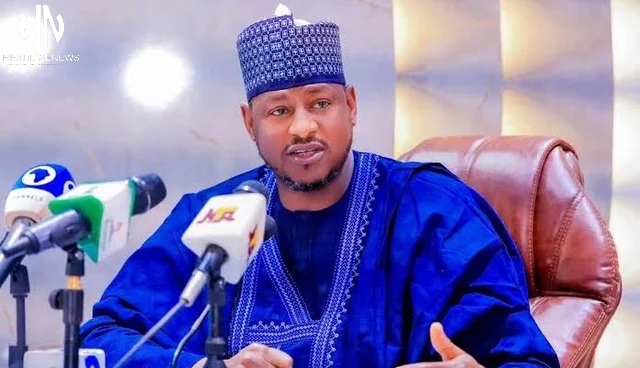Katsina State Governor, Dikko Umar Radda, has disclosed a deeply emotional and politically significant revelation about the final conversation he had with former President Muhammadu Buhari before his passing—specifically, what the late leader said about his successor, President Bola Ahmed Tinubu.
Speaking during the solemn burial rites of the former president in Daura, Katsina State, Governor Radda stunned mourners and political observers alike with a candid recount of Buhari’s private words, particularly regarding Tinubu’s controversial removal of fuel subsidy—a move that has divided opinion nationwide.

“I pity Bola,” Buhari was quoted as saying, referencing President Tinubu by his first name.
“Removing fuel subsidy took real courage. When I was president, people always convinced me not to do it. But Tinubu acted fast. If he had listened to others, it might never have happened.”
According to Radda, Buhari appeared deeply reflective in his final days and acknowledged the immense political weight of the fuel subsidy decision—a burden he admitted he could not carry during his administration.
A Rare Glimpse Into Buhari’s Thoughts
The statement has since gone viral, igniting debate across political circles, social media platforms, and among ordinary Nigerians. Many view Buhari’s final comment as both an admission and a tacit endorsement of Tinubu’s daring economic reform—even amid the hardships it has triggered.
The former president, who passed away at the age of 82, was buried in his hometown with full military honors, attended by family, friends, political associates, and national dignitaries. But it was this unexpected insight into Buhari’s view of Tinubu’s presidency that stole the moment.
Governor Radda’s revelation has added a new layer to the complex legacy of both men—Buhari, who was often criticized for kicking the subsidy issue down the road; and Tinubu, whose swift removal of the subsidy just weeks into office set off economic shocks, protests, and praise in equal measure.

Public Reactions: Praise, Criticism, and Reflection
The public response to Buhari’s last words has been as mixed as the subsidy issue itself. Some Nigerians have hailed Tinubu for his boldness in tackling what previous administrations avoided for decades. Others argue that while the decision may be economically sound, the lack of adequate cushioning measures for the poor has made life unbearable for millions.
Economists have long called for an end to the costly fuel subsidy regime, describing it as unsustainable and prone to corruption. However, critics of Tinubu’s approach say his government acted too quickly and without a comprehensive safety net in place.

“It’s not just about courage,” said one social media user on X (formerly Twitter). “It’s about timing and planning. Courage without compassion is not leadership.”
Others, however, echoed Buhari’s sentiment:
“Finally, a Nigerian president who didn’t wait for permission to do what’s necessary,” wrote another commenter. “If Buhari had done it, maybe our economy wouldn’t be in this mess.”
A Legacy Still Unfolding
As the nation continues to reflect on the death of its former leader and the turbulent early months of Tinubu’s presidency, Buhari’s parting words have become a poignant footnote in Nigeria’s political history.
Governor Radda, visibly emotional as he spoke, concluded his remarks by urging Nigerians to unite in building the country both Buhari and Tinubu had tried—each in their own way—to reform.
“Our late leader had his regrets, but he also had his hopes. Let us not waste the courage he finally recognized in others,” he said.
💬 Now We Ask: What Do You Think?
-
✅ Was Tinubu right to remove the subsidy quickly and decisively?
-
❌ Or should he have consulted more and built support before taking such a massive step?
Let your voice be heard in the comments. This conversation is just getting started—and it’s one the nation needs to have.
For more exclusive updates and stories, visit www.headlinenews.news





